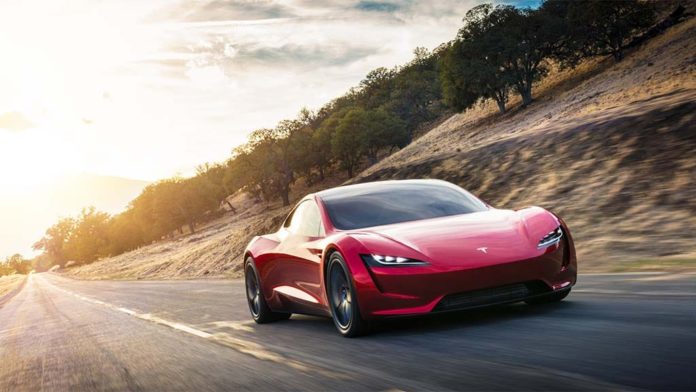As warm weather finally descends across the country, many motorists are looking to go alfresco. But what happens as the auto industry accelerates its shift to electric propulsion?
Cheating the wind is an essential element in EV design. Drag is the enemy of both range and performance. And rolling back the top on a convertible can seriously impact both. Nonetheless, there are plenty of buyers who don’t want to give up the feeling of wind in their hair.
A surprising number of brands are responding with both ragtop and removable top designs. Here are some of the most significant ones now on the market or set to arrive soon.
Tesla Roadster
The original Roadster was Tesla’s first product line and holds a special place in the hearts of many brand loyalists — as well as CEO Elon Musk. He announced the second-generation Roadster in 2017 but many observers have been questioning whether it’s the automotive equivalent of vaporware.
For his part, Musk assured investors and Tesla fans during the company’s recent earnings webcast the Roadster really is on its way to market. But it’s again been pushed back, with production not expected to begin until 2024.

Musk described the open-top two-seater as the “cherry on the icing on the cake” for Tesla. He’s promised that it would be the fastest car in the world, with a sub-2-second 0-60 launch — though the new Rimac Nivera could be hard to beat considering it hit 60 in a recent record run at 1.74 seconds. If and when it does reach production, look for a price of at least $200,000, with the initial, limited-run Tesla Roadster Founder’s Series at $250,000.
Chevrolet Corvette Convertible
General Motors is “on a path to an all-electric future,” according to CEO Mary Barra, and she’s not making any exceptions for the vehicle often known as “America’s sports car.” Chevy is now readying the first-ever Corvette hybrid, the E-Ray offering some of the nameplate’s best-ever power and performance. But an all-electric ‘Vette is in the works.
Expected to launch in 2025 or soon after at a price of at least $100,000, there will, of course, be a classic hardtop version of the battery-powered Chevrolet Corvette. The bow-tie brand has yet to confirm that there will be a ragtop version, as well, but considering convertibles accounted for 48% of total ‘Vette sales last year, it’s considered a highly likely option.
Considering the power and performance that competing manufacturers like Ferrari and Lamborghini will make from their EVs, it’s expected that the all-electric versions of the Chevrolet Corvette will have to deliver similarly exotic numbers. Few would be surprised if the Detroit sports car comes in near — and even above — 1,000 horsepower.
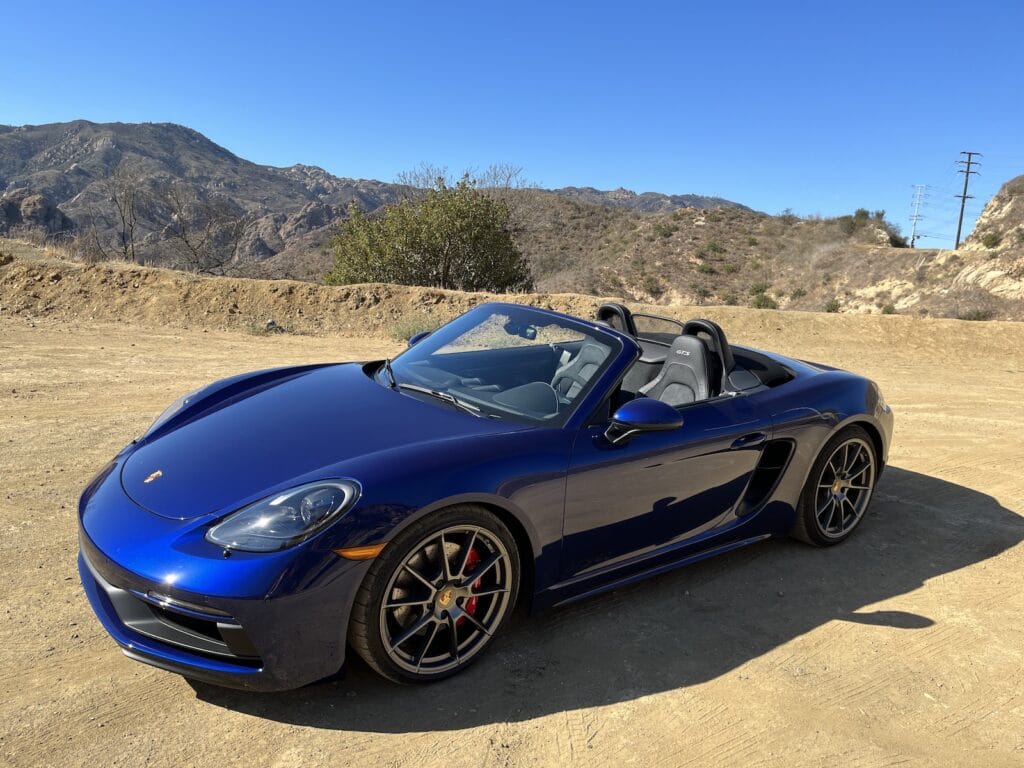
Porsche Boxster
The iconic German brand scored a solid hit with its first all-electric model, the Taycan. And it isn’t stopping there, with a battery-powered version of the Macan crossover to follow.
“The future of Porsche is electric,” CEO Oliver Blume said last year and, among the projects to follow, look for a battery-powered version of the 718 Boxster roadster.
Set to debut in 2025, test mules have already been spotted on public roads. As has been the case with other vehicles switched to EV power, those prototypes have adopted longer wheelbases. Among other things, that should provide more space for the big battery pack that would be needed to deliver acceptable range.
Polestar 6
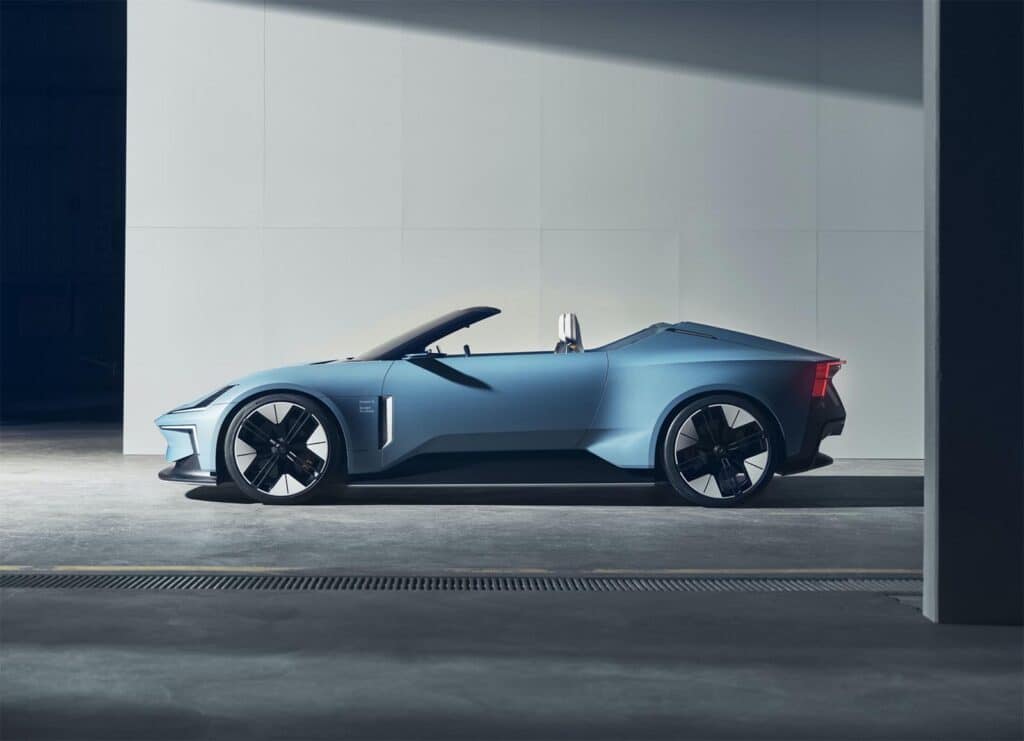
Volvo’s EV spinoff brand has made performance a high priority and it’s promising plenty for the production version of its Precept concept. “The Polestar 2,” it says, “will take the design language established by Polestar Precept further, creating a new premium performance paradigm as an all-electric roadster.”
The concept debuted at the Los Angeles International Auto Show in hardtop form, but there are expectations it will be offered in an optional convertible version, as that’s the true form for a roadster.
The automaker has indicated the two-door model will share underpinnings with the less sporty Polestar 5 sedan, as well as its 800-volt electrical architecture. That would deliver something on the order of 871 hp and 664 lb-ft of torque from a pair of electric motors. Launch times have been estimated at somewhere just above 3 seconds 0-60. Pricing, meanwhile, is forecast around $200,000
GMC Hummer EV Pickup and SUV
Can we call these two all-electric trucks convertibles? That all depends upon your definition. They certainly come close, with removable roof panels that can be stored in the frunk, or front trunk, where a conventional motor normally would sit.
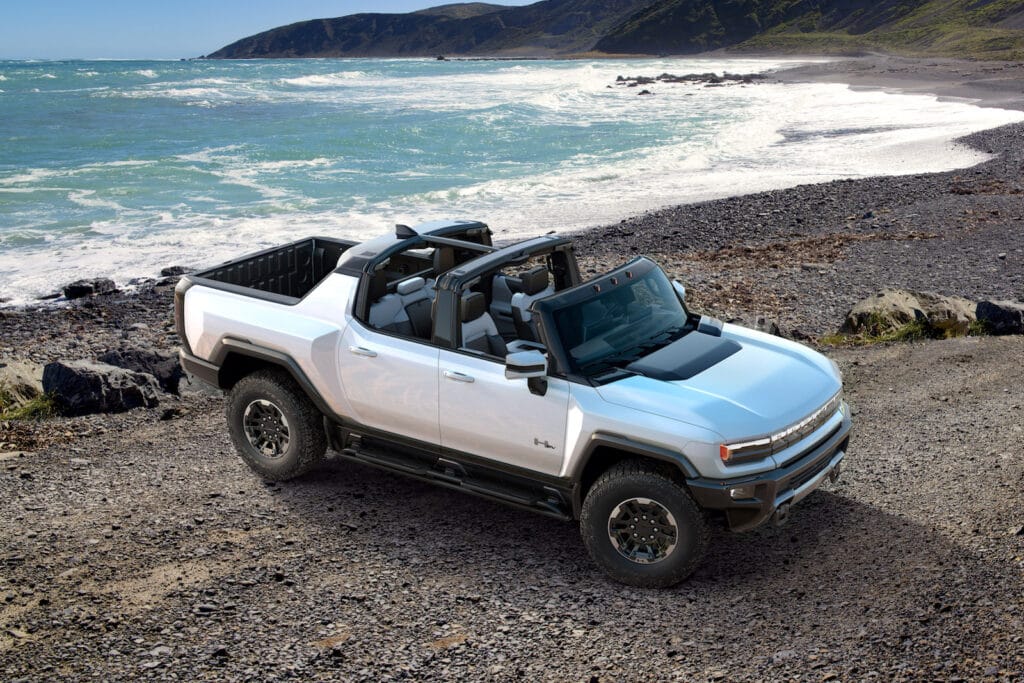
In its initial launch form, the Hummer pickup was offered with a three-motor drivetrain delivering 1,000 hp and 1,200 lb-ft of torque. And in WTF, er, “Watts to Freedom,” mode, this 9,000-lb behemoth can hit 60 in barely 3 seconds, while towing up to 7,500 pounds. The SUV is just making its way into GMC showrooms. And we’ll see less powerful versions of both Hummer models to follow.
At launch, the GMC Hummer EV Edition 1 pickup came in at $110,295, after factoring in the $1,595 destination fee.
Jeep Recon
The off-road brand’s first all-electric model is getting close to production, with a limited supply expected to roll into showrooms by late 2023. Pricing should start around $60,000.
It’s not a classic convertible but owners will go even more alfresco, if you will, since Recon not only features a power-opening top that can be operated with a single button press, but its doors also can be removed, much like the similarly sized Jeep Wrangler.
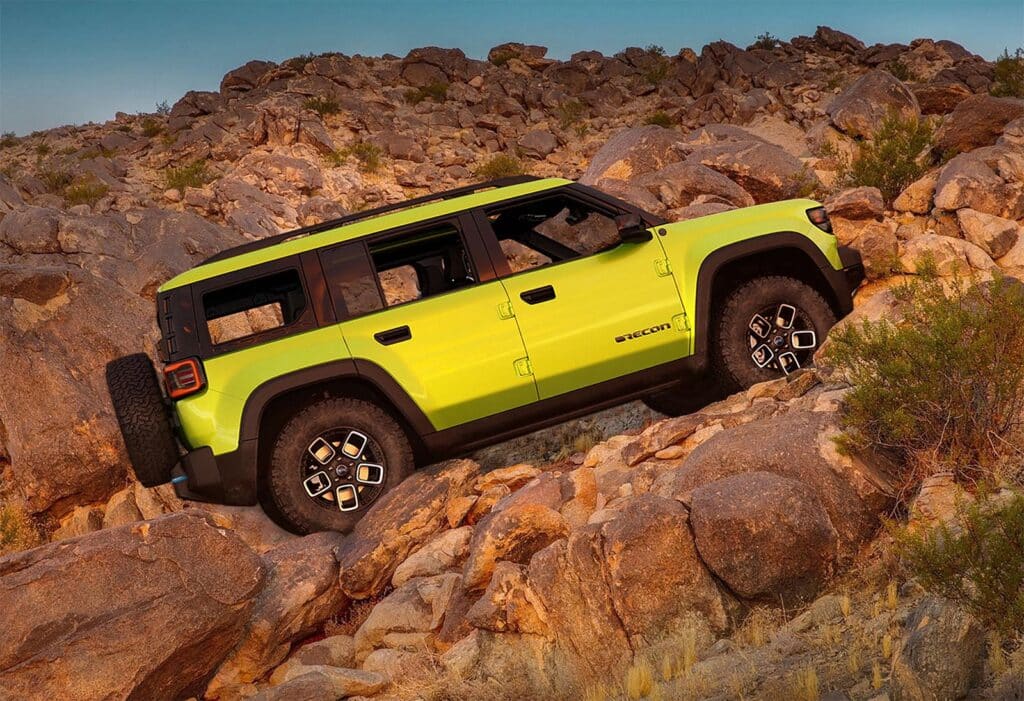
Like the Wrangler, the new Jeep Recon will be designed to handle the most serious of off-road trails, including the iconic Rubicon Trail in California. That will mean features like electronically lockable axles, oversized off-road tires and an EV version of Jeep’s Selec-Terrain traction system that can be set to compensate for different conditions, such as “Mud and Ruts” or “Ice and Snow.” And, officials promise, it will have enough power to get there and then return home.
Fisker Ocean
The first all-electric model developed by Danish designer and entrepreneur Henrik Fisker will be an SUV, as one would expect in today’s market. But it will boast a feature designed to appeal to convertible fans. Using Ocean’s “California Mode,” a driver simply will need to press a button to have the top and windows roll open. That includes the rear glass, or “Doggie Window,” as Fisker prefers to call it.
Ocean will be offered in a variety of configurations, including all- and front-wheel-drive models. At the top end, it will make as much as 550 hp and be capable of a 3.6-second launch from 0 to 60. Top range is EPA-estimated at 350 miles.
With prices starting just under $38,000, sales were supposed to launch early this year. But while a small number of Fisker Ocean models have been delivered in the company founder’s home of Denmark, it’s unclear when U.S. sales will commence. The company is still looking to do so this year.
More to come
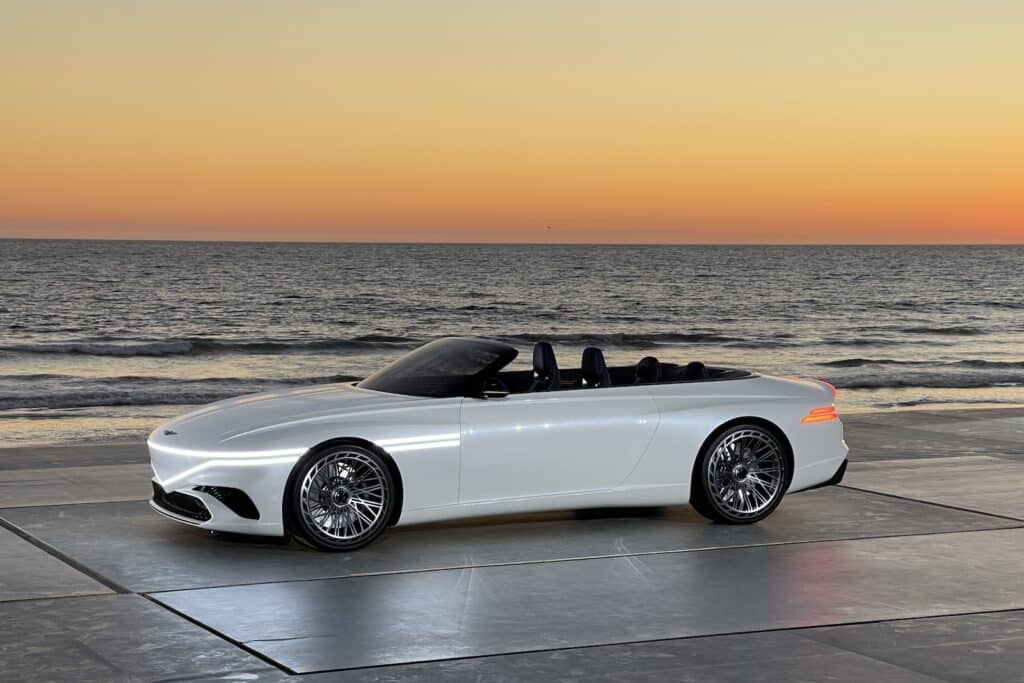
Still more EV convertibles appear to be coming to the U.S. during the next few years. These are expected to include products from:
- Audi, which is expected to use some of the design cues first seen in the form of the skysphere concept. CEO Herbert Diess suggested, ahead of his recent retirement, that Audi parent Volkswagen might convert its underutilized Osnabruck factory to function as a “niche convertible location;”
- Volkswagen, which would also benefit from using that Osnabruck plant. It’s been reported that a convertible is under development based on the little, all-electric ID.3 model now sold in Europe;
- Bentley, the ultra-luxury member of the Volkswagen Group, is working up an assortment of EVs and will start off in 2025 with versions of its Continental family, including both a sedan and a performance coupe. Based on the Batur concept, expect to see an all-electric Bentley GTC convertible follow;
- Genesis is working up an Electric Convertible, or so Automotive News recently reported. The brand already has three EVs in production, including a sedan and two SUVs. It’s moving towards an all-electric future and that, apparently, will include a version of the Genesis X concept;
- Maserati appears to be working up several ragtops, including a version of its first all-electric model, the GranTurismo Folgore. The GranCabrio Folgore is expected to use a similar, three-motor drivetrain producing 751 hp and 996 lb-ft of torque. Also expected; the all-electric Maserati MC20 Cielo Folgore, a convertible supercar priced around $250,000;
- Mercedes-Benz has been rolling out a variety of all-electric models, starting with the flagship EQS sedan. Brand chief technical officer Markus Schäfer said in late 2021 that the Mercedes-AMG unit “definitely (must) think about a (zero-emission) cabriolet;”
- Rolls-Royce has launched its first all-electric model, the Spectre, and there are widespread expectations that a convertible version also is in the works. The hardtop model is, as is the norm for Rolls, a behemoth. But it provides plenty of space for the necessary battery pack.
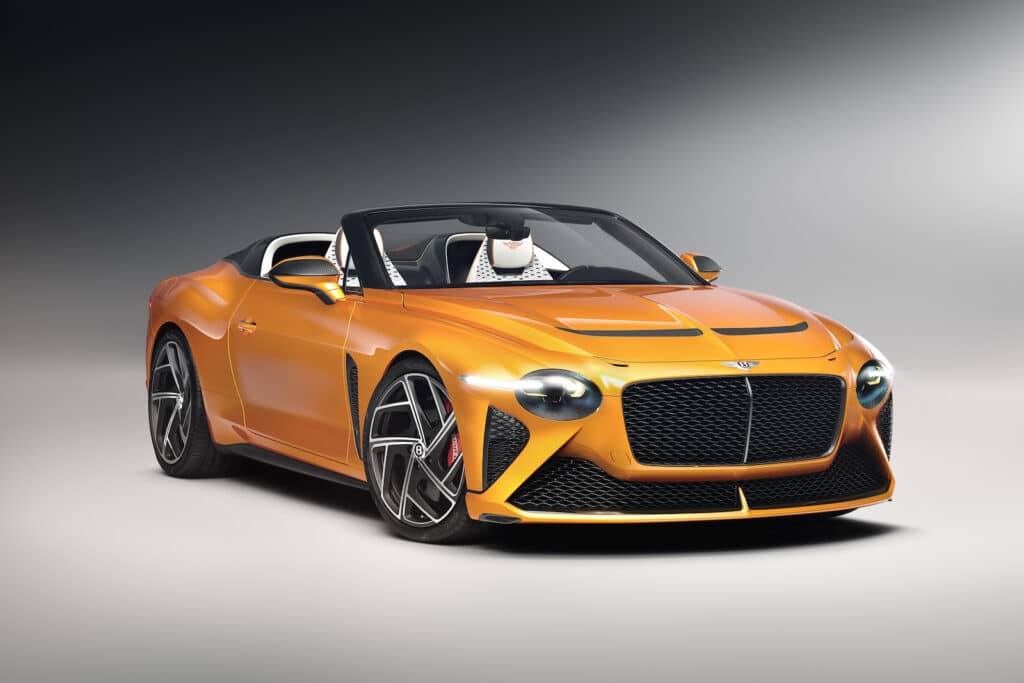
European motorists are likely to have several more all-electric convertibles available in the next few years. That reflects the reality that Continental motorists typically drive shorter distances and seem more willing to tolerate the lower range ragtop EVs will be able to deliver.
Among the EV Convertibles currently or soon to come in Europe are:
Mini Cooper SE Convertible
The second-generation Mini Cooper SE is being offered with a ragtop option — just not in the U.S., at least for now. And that’s for good reason considering that, even with a bigger battery pack, it delivers an estimated 125 miles per charge using the global WLTP standard — which likely would translate into around 100 miles between charges using the tougher EPA target. Even in Europe, volumes are low, the British brand rolling out just 999 this year.
For those who can live with such limited range, the Cooper SE Convertible features a power-operated cloth top that can be raised or lowered at speeds up to around 19 mph. The top can be partially opened, much like the conventional, gas-powered Mini Convertible.
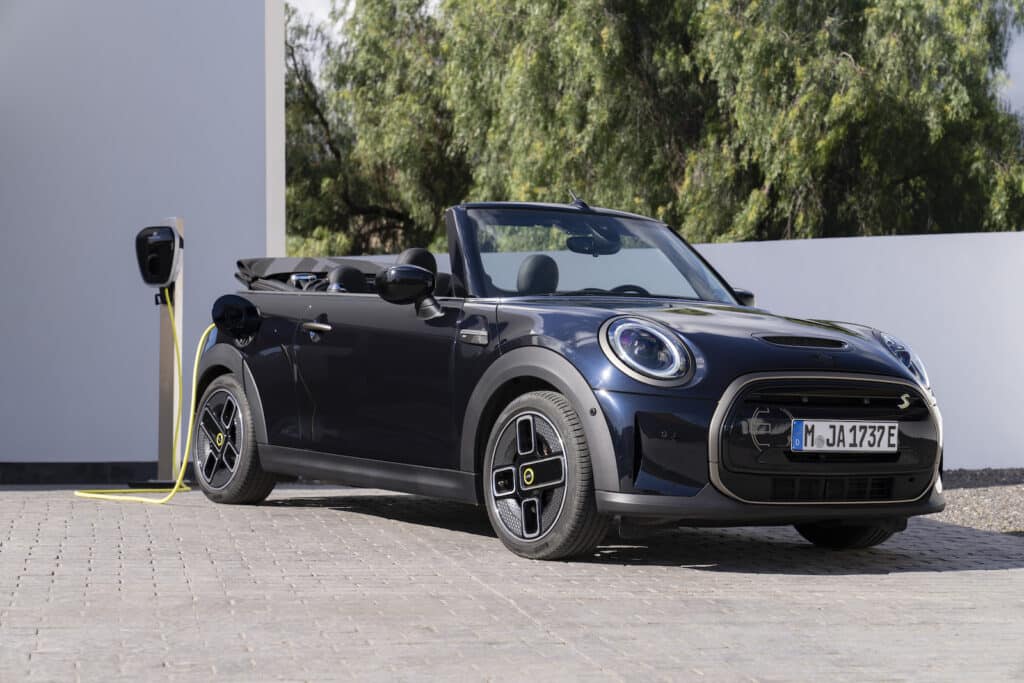
Power comes from a single electric motor drawing power from a modest 32.6 kilowatt-hour lithium-ion battery. Making 181 horsepower and 199 pound-feet of torque, it can launch from 0 to 60 in 8.2 seconds.
Smart EQ fortwo Cabrio
While the Smart brand abandoned the U.S. market, it’s alive and doing quite well in Europe. And it has gone 100% electric.
That includes the latest version of the Smart fortwo convertible, now known as the Smart EQ EQ fortwo Cabrio. The two-seater features an easy to operate manual ragtop. Its single electric motor delivers about 82 horsepower. That will get you from 0-60 in about 11.2 seconds, Smart claims.
The Cabrio has a WLTP range of a modest 80 miles and can go from a 10% to 80% charge in about 40 minutes using a DC public quick charger.

